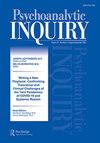Dramatology Revisited: The Person as Doer and Dreamer
IF 0.5
4区 心理学
Q3 PSYCHOLOGY, PSYCHOANALYSIS
引用次数: 0
Abstract
ABSTRACTThe author revisits his previous papers on dramatology published in 2009, 2011, and 2015, adding the results of new research. The additions are ideas about dramatic action by philosophers William James and John Dewey and literary theorist Kenneth Burke. There is a new discussion of the relation between dramatology and narratology. The approach is a retrospective application of dramatization to Freud’s method in analyzing the famous cases of Dora and Schreber. A new finding is dramatization in DSM-5 diagnoses. Another new interest is applying dramatology to Freud’s mass psychology and world-wide events as dramas of history.KEYWORDS: Actdramadramatizationdramatologynarratologytrauma Disclosure statementNo potential conflict of interest was reported by the author.Additional informationNotes on contributorsHenry Zvi LothaneHenry Zvi Lothane, M.D., is Clinical Professor at Icahn School of Medicine at Mount Sinai, Distinguished Life Member of American Psychiatric Association, and Member of International Psychoanalytical Association and American Psychoanalytic Association. He is the author of In Defense of Schreber: Soul Murder in Psychiatry and a new book on Sabina Spielrein, in press. He was also the guest editor of Psychoanalytic Inquiry Volume 38, Number 6, “Free Association.”重新审视戏剧学:实干家和梦想家
摘要作者回顾了其2009年、2011年和2015年发表的戏剧学论文,并增加了新的研究成果。新增的内容是哲学家威廉·詹姆斯、约翰·杜威和文学理论家肯尼斯·伯克关于戏剧行为的观点。对戏剧学与叙事学的关系进行了新的探讨。该方法是对弗洛伊德的戏剧化方法在分析著名的朵拉和施雷伯案例中的回顾性应用。一项新的发现是DSM-5诊断的戏剧化。另一个新的兴趣是将戏剧学应用于弗洛伊德的大众心理学和作为历史戏剧的世界事件。关键词:戏剧表演;戏剧叙事;创伤披露声明作者未发现潜在的利益冲突。作者简介:henry Zvi Lothane,医学博士,西奈山伊坎医学院临床教授,美国精神病学协会杰出终身会员,国际精神分析协会和美国精神分析协会会员。他是《为施雷伯辩护:精神病学中的灵魂谋杀》和一本关于萨宾娜·斯皮尔林的新书的作者,即将出版。他也是《精神分析探究》第38卷第6期“自由联想”的客座编辑。
本文章由计算机程序翻译,如有差异,请以英文原文为准。
求助全文
约1分钟内获得全文
求助全文
来源期刊

Psychoanalytic Inquiry
PSYCHOLOGY, PSYCHOANALYSIS-
CiteScore
1.00
自引率
33.30%
发文量
65
期刊介绍:
Now published five times a year, Psychoanalytic Inquiry (PI) retains distinction in the world of clinical publishing as a genuinely monographic journal. By dedicating each issue to a single topic, PI achieves a depth of coverage unique to the journal format; by virtue of the topical focus of each issue, it functions as a monograph series covering the most timely issues - theoretical, clinical, developmental , and institutional - before the field. Recent issues, focusing on Unconscious Communication, OCD, Movement and and Body Experience in Exploratory Therapy, Objct Relations, and Motivation, have found an appreciative readership among analysts, psychiatrists, clinical psychologists and a broad range of scholars in the humanities.
 求助内容:
求助内容: 应助结果提醒方式:
应助结果提醒方式:


